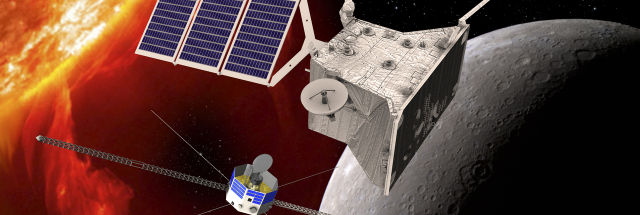In a space race between two companies started by Jeff Bezos, his e-commerce company, Amazon, beat his rocket company, Blue Origin, to reach orbit.
Two prototype Amazon satellites were launched atop an Atlas V rocket at Cape Canaveral Space Force Station in Florida on Friday. It is part of the Kuiper Project, a communications constellation that will eventually consist of more than 3,200 satellites. It will compete with SpaceX’s Starlink and other satellite internet services.
The rocket was launched at 2:06 PM ET. The rocket’s upper stage then separated from the booster several minutes into the flight, carrying the satellites into orbit.
in press releaseUnited Launch Alliance, the company that delivered the Atlas V rocket into space, said that the launch was successful, noting that the rocket delivered the two satellites to the required orbit at an altitude of 311 miles. On Friday evening, Amazon said in a statement It made contact with both satellites in orbit less than an hour after launch.
After deploying the solar panels and testing the spacecraft’s systems, the satellites will beam Internet communications from space to the company’s flat, square antennas for consumers on Earth.
“This is the first time Amazon has launched satellites into space, and we will learn an incredible amount regardless of how the mission goes,” Rajeev Badial, Amazon’s vice president of technology for Project Kuiper, said in a statement from the company. Before launch.
Amazon builds satellites, while Mr. Bezos’ other company builds rockets, so why shouldn’t one fly over the other? That’s because Blue Origin hasn’t launched anything into orbit yet.
Although its New Shepard suborbital space tourist rocket has made many flights, the New Glenn rocket, which has been in development for more than a decade to carry payloads such as Kuiper satellites into orbit, is at least three years behind schedule. Its maiden flight is scheduled to begin next year.
In April last year, Amazon announced a massive purchase of 83 launches, the largest commercial purchase of rocket launches ever. This includes 27 from Blue Origin and the rest from two other companies, Arianespace from France and United Launch Alliance from the United States. Contracts with other companies also depend on new rockets that have not yet been launched: Ariane 6 from Arianespace and Vulcan from United Launch Alliance.
Amazon also previously announced that it had purchased from United Launch Alliance nine launches for its venerable Atlas V rockets. The Atlas 5 has been flying for more than two decades, but was retired because it relies on Russian-made rocket engines.
The two satellites, KuiperSat-1 and KuiperSat-2, comprise what Amazon calls Kuiper’s Protoflight mission. It was scheduled to serve as the payload for the maiden launch of United Launch Alliance’s Vulcan rocket in May. But during testing of the Vulcan upper stage, a hydrogen leak ignited in a fireball. In July, Torey Bruno, CEO of United Launch Alliance, said the company was working to fix the problem, and that Vulcan’s first flight was still expected before the end of the year.
In August, Amazon announced that it would change rockets from Vulcan to Atlas V. This was Protoflight’s second rocket conversion. Amazon originally planned to launch KuiperSat-1 and KuiperSat-2 on smaller rockets from ABL Space Systems, but ABL also faced delays.
Officials at Blue Origin, Arianespace and United Launch Alliance said they expect to stick to the schedule for Kuiper launches.
The Federal Communications Commission, which regulates satellite communications on Earth, approved Amazon’s network in 2020. It gave the company a deadline to launch half of its 3,236 satellites by July 2026, with the full constellation deployed by July 2029.
A pension fund that owns Amazon shares sued Amazon in August for not buying any launches from SpaceX, which has launched Falcon 9 rockets 70 times this year and has contracts with other competitors for its Starlink service.
The complaint, filed by the Cleveland Bakers and Teamsters Retirement Fund, said Amazon’s board approved the launch contracts after only cursory reviews and took no steps to protect Amazon from Mr. Bezos’ conflicts of interest as owner of Blue Origin as well as Amazon. Amazon CEO at the time.
“For a year and a half, Bezos was free to identify and negotiate with Amazon’s launch service providers, while also being free to negotiate against Amazon on behalf of Blue Origin,” the lawsuit said.
Not only will Blue Origin provide New Glenn launches to Amazon, but it will also provide profits from Vulcan launches, because United Launch Alliance is purchasing Blue Origin’s BE-4 engines to power the booster stage of Vulcan rockets.
“The allegations in this lawsuit have absolutely no merit, and we look forward to showing that through the legal process,” an Amazon spokesperson said in a statement.
The lawsuit also summarized years of animosity between Mr. Bezos and Elon Musk, the founder and chief executive of SpaceX.
“Given their bitter track record, Bezos had every reason to exclude Musk’s SpaceX from the operation entirely,” the lawsuit said. “It must be assumed that Bezos could not swallow his pride and asked for his arch-rival’s help in launching satellites for Amazon.”

“Typical beer advocate. Future teen idol. Unapologetic tv practitioner. Music trailblazer.”







More Stories
Dow Jones hits 40,000 points for the first time
Walmart shares surged after earnings beat, and market cap surpassed $500 billion
Chinese electric car manufacturer Nio has revealed its competitor to the Tesla Model Y